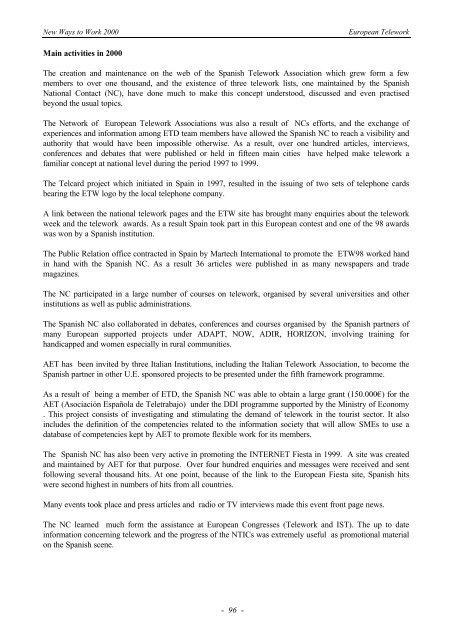eWORK 2000 - European Telework Week
eWORK 2000 - European Telework Week
eWORK 2000 - European Telework Week
- No tags were found...
You also want an ePaper? Increase the reach of your titles
YUMPU automatically turns print PDFs into web optimized ePapers that Google loves.
New Ways to Work <strong>2000</strong><strong>European</strong> <strong>Telework</strong>Main activities in <strong>2000</strong>The creation and maintenance on the web of the Spanish <strong>Telework</strong> Association which grew form a fewmembers to over one thousand, and the existence of three telework lists, one maintained by the SpanishNational Contact (NC), have done much to make this concept understood, discussed and even practisedbeyond the usual topics.The Network of <strong>European</strong> <strong>Telework</strong> Associations was also a result of NCs efforts, and the exchange ofexperiences and information among ETD team members have allowed the Spanish NC to reach a visibility andauthority that would have been impossible otherwise. As a result, over one hundred articles, interviews,conferences and debates that were published or held in fifteen main cities have helped make telework afamiliar concept at national level during the period 1997 to 1999.The Telcard project which initiated in Spain in 1997, resulted in the issuing of two sets of telephone cardsbearing the ETW logo by the local telephone company.A link between the national telework pages and the ETW site has brought many enquiries about the teleworkweek and the telework awards. As a result Spain took part in this <strong>European</strong> contest and one of the 98 awardswas won by a Spanish institution.The Public Relation office contracted in Spain by Martech International to promote the ETW98 worked handin hand with the Spanish NC. As a result 36 articles were published in as many newspapers and trademagazines.The NC participated in a large number of courses on telework, organised by several universities and otherinstitutions as well as public administrations.The Spanish NC also collaborated in debates, conferences and courses organised by the Spanish partners ofmany <strong>European</strong> supported projects under ADAPT, NOW, ADIR, HORIZON, involving training forhandicapped and women especially in rural communities.AET has been invited by three Italian Institutions, including the Italian <strong>Telework</strong> Association, to become theSpanish partner in other U.E. sponsored projects to be presented under the fifth framework programme.As a result of being a member of ETD, the Spanish NC was able to obtain a large grant (150.000€) for theAET (Asociación Española de Teletrabajo) under the DDI programme supported by the Ministry of Economy. This project consists of investigating and stimulating the demand of telework in the tourist sector. It alsoincludes the definition of the competencies related to the information society that will allow SMEs to use adatabase of competencies kept by AET to promote flexible work for its members.The Spanish NC has also been very active in promoting the INTERNET Fiesta in 1999. A site was createdand maintained by AET for that purpose. Over four hundred enquiries and messages were received and sentfollowing several thousand hits. At one point, because of the link to the <strong>European</strong> Fiesta site, Spanish hitswere second highest in numbers of hits from all countries.Many events took place and press articles and radio or TV interviews made this event front page news.The NC learned much form the assistance at <strong>European</strong> Congresses (<strong>Telework</strong> and IST). The up to dateinformation concerning telework and the progress of the NTICs was extremely useful as promotional materialon the Spanish scene.- 96 -








